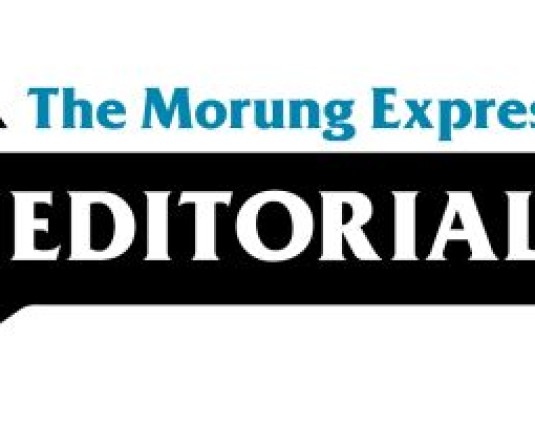
By Dr Asangba Tzudir
The Election Commission of India (ECI) seizure at Rs. 4658.16 Cr so far is the highest ever for Lok Sabha polls, and it will be interesting to see the final amount at the end of the election. At the moment, the amount is much higher than that Rs. 3475 Cr seized during the entire Lok Sabha elections of 2019. This trend in itself attests the role of money power in the electioneering process. Very interestingly, Nagaland was the only state with ‘Nil’ seizure of cash and precious metals. Does this mean clean election is working in Nagaland?
Coming to Nagaland, 13,25,383 electorates are supposed to exercise franchise on 19 April 2024 and which is subject to participation of ENPO. Otherwise the number will get reduced to 9,24,751 electorates if ENPO abstains from voting, and which will be a symbolic gesture of dissent. While voting is a right, it is also something which is not forced. However, irrespective of whether ENPO votes or not, the voting and counting and results declaration will happen based on the votes casted in other districts and constituencies. ON the whole, the constitutional mechanism will continue. One may be reminded of the 1998 Nagaland State Legislative Assembly Elections that was held in February 1998 and which was held at the backdrop of the 1997 ceasefire Agreement where the NSCN (IM) and the Naga Hoho demanded the postponement of the elections till the conclusion of the peace talks. Since the Election Commission was not amenable to their arguments, they called for a boycott of the polls.
The elections went ahead and the INC won a majority of the seats. Regional parties like the Naga People’s Front did not contest the elections and they were joined by the BJP. In 43 constituencies, the INC candidate was the sole candidate and thereby declared the winner, and while in the 17 constituencies, the INC had to contest only with the independents which 7 of them won.
Coming to the upcoming Lok Sabha election, the Congress Party was first to release their manifesto ahead of BJP. The INC manifesto called ‘Nyay Patra’ focuses on ‘five pillars of justice’. The BJP then released its manifesto ‘Sankalp Patra’ with focus on development and welfare and which had ‘Modi ki Guarantee’ on North-East India.
Both Congress and BJP highlighted something contentious in relation to Nagas. While Congress assured of bringing the final solution to Naga political issue, the BJP reiterated its stand to draw a Uniform Civil Code. However, on the Naga Political Issue and the final solution, the Congress had to issue corrigendum regarding the pledge in page 37 of their manifesto. However the reality of the Naga political settlement is that it became a talking point since Nagaland first conducted its Legislative Assembly Elections and till today it is being discussed besides being included in the election manifestos over the years. On the BJP manifesto, the ‘Uniform Civil Code’ has been sharply critiqued, and it was at this backdrop and more so its background ideology that the Nagaland Baptist Church Council’s (NBCC) Clean Election Movement (CEM) appealed to all to “vote consciously by fearing God, and exercising God given ability to choose right from wrong”, that, “the upcoming Lok Sabha election seemed to be less of a political tussle, but more of an ideological clash for the survival of democracy in India.” This was however slammed by the Nagaland Unit of JD (U) saying that it was “flabbergasted” by the NBCC Clean Election Movement’s appeal to Nagaland Voters to ‘vote consciously’ against “bigotry”, that if “bigotry is to mean BJP, then “it is absolutely misconstructed.” The Ao Baptist Churches Conference (ABAM) while reiterating to uphold the democratic traditions of our country called upon every voter for ‘qualitative participation.’ Meanwhile, in a Pre-poll Survey 2024 conducted by The Hindu CSDS-Lokniti poll, 79% of the respondents state that, “India belongs to all religions equally, and not just Hindus.” This also attests that most Indians believe in plurality.
While the Congress in Nagaland appeals to vote for the Secular candidate in order to uphold democratic and secular values, the NDPP-BJP led opposition-less PDA government pitches the ‘Opposition-less’ government narrative to woo voters while pitching for their ‘consensus’ candidate. While addressing an election rally at Zunheboto town, Chief Minister Rio said that, “Dr. Chumben, with the support of all the 60 legislators, was the right person to be the voice of the Nagas in the parliament.” Apart from the 60 legislators, do the people of Nagaland also think in the same line? If not, then it becomes a mis-represented position.
While the Nagaland Legislative Assembly elections has been a witness to bringing up consensus candidate on the lines of party, village, tribe, range etc., which is against the very spirit of clean and fair election, neither is the choosing of the PDA consensus candidate for the lone Lok Sabha seat by the 60 legislators clean and fair.
The talk of clean elections in Nagaland has come a long way, yet it continues to struggle in solidifying its form and content. And while clean and fair elections has a lot to do with beginning from choosing the right leader as a candidate, yet choosing the right leader becomes a very difficult proposition under the present electoral system in Nagaland. Nonetheless, clean and fair election is not only relevant for the upcoming Lok Sabha elections, but should continue to solidify its form and content and keep the movement alive.
However, for clean and fair elections to become a movement in the right sense of the term, it should first start empowering the citizens by conscientizing them and making them well informed so that the right decisions are taken during each step of the electoral process.
(Dr Asangba Tzudir writes a weekly guest editorial for The Morung Express. Comments can be mailed to asangtz@gmail.com)






